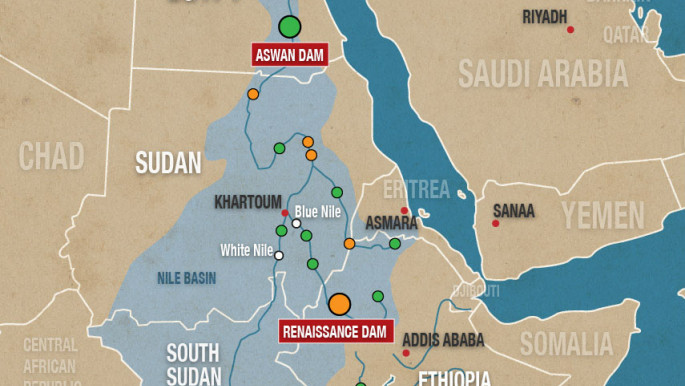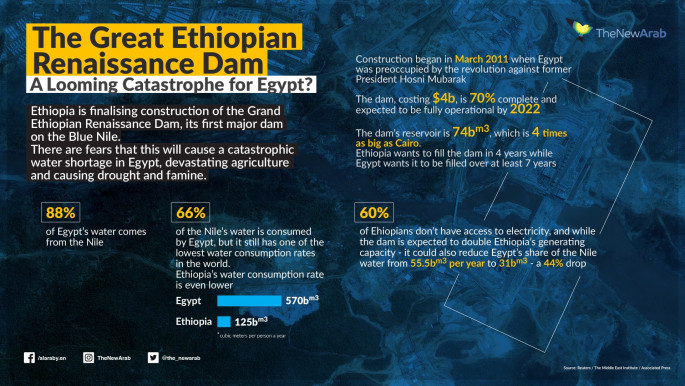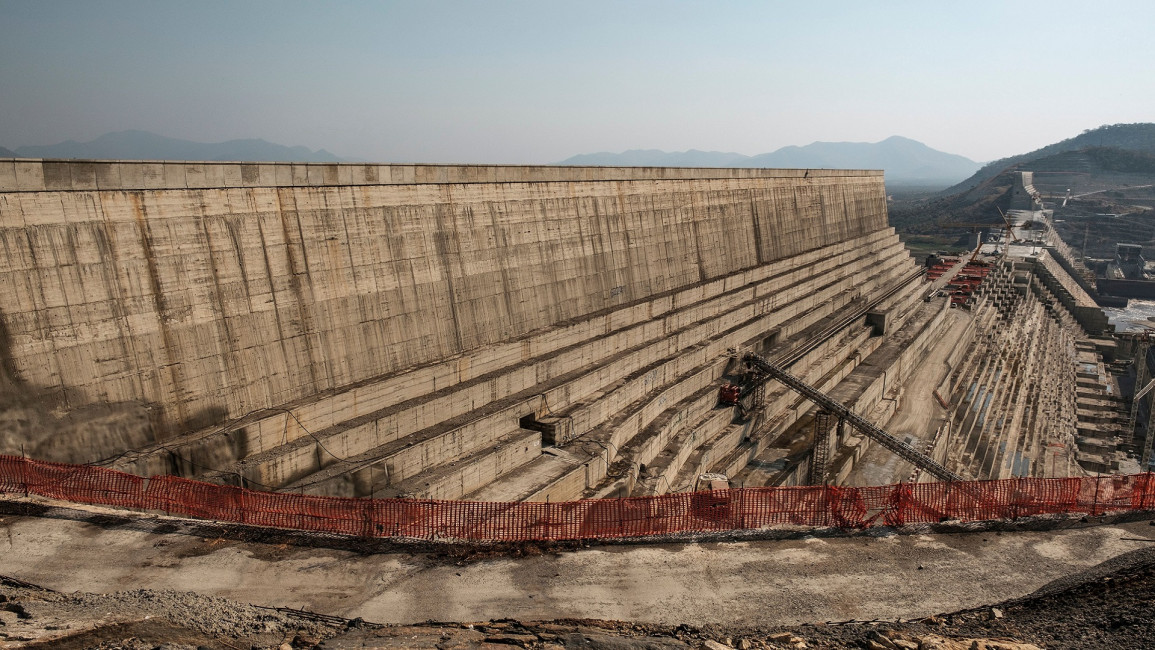Nile negotiations break down as Egypt, Sudan accuse Ethiopia of rejecting legally binding agreement
The latest round of talks between three key Nile basin countries have failed to resolve a critical dispute over the construction of a giant $4.6 billion hydroelectric dam in Ethiopia, the irrigation ministers of Sudan and Ethiopia announced on Wednesday.
The negotiations began on 9 June and were conducted by the countries' irrigation ministries via video-link due to the coronavirus.
In a press statement, Egyptian Irrigation and Water Resources Minister Mohammed Abdul Ati said that Ethiopia had refused to reach an agreement regarding the dam's operation, which would be binding under international law.
Instead, Ethiopia and had instead only offered to agree to guidelines which Addis Ababa could change unilaterally at any time.
Hisham Abdalla, a Sudanese negotiation, echoed the Egyptian minister’s words, saying that while the countries had previously agreed to sign a legally binding deal, Ethiopia had reneged on this.
"Ethiopia, however, in this round retracted, suggesting that the deal to be a guiding one that could be modified or canceled. This is a very serious situation," he said.
Egypt fears that unregulated operation of the Great Ethiopian Renaissance Dam (GERD) could drastically reduce the flow of Nile water to Egyptian territories, causing drought and famine.
Ethiopia says the dam is essential to its future development and will pull millions of Ethiopians out of poverty.
Read more: Ethiopia's Great Renaissance Dam - A catastrophe for Egypt?
The Egyptian statement said that talks had "not reached any significant progress", blaming Ethiopia's "intransigent positions on the technical and legal issues".
Ethiopia wants to begin filling the dam's massive reservoir in the coming weeks, but Egypt says that filling the reservoir too quickly will severely reduce its water supply.
Both countries have hinted at military action in the past to protect their interests should negotiations fail, and experts fear a breakdown in talks could lead to conflict.
In contrast to the Egyptian statement, the Ethiopian irrigation ministry said that the talks had "ended with an agreement to continue negotiations".
Last week, Ethiopian Prime Minister Abiy Ahmed said that the reservoir would be filled with 4.9 billion cubic metres of water starting in July, adding that 50 million Ethiopians currently lived without electricity and clean water.
This contrasts sharply with the situation to Egypt, where he claimed 98 percent of the population have electricity.
Ethiopia's position is that Egypt does not have the right to stop it from filling the reservoir at its own pace.

Sudan has long been caught between the competing interests of Egypt and Ethiopia. It stands to benefit from Ethiopia’s dam, including having access to cheap electricity and reduced flooding, but it has raised fears over the operation and safety of the Ethiopian project and says it could endanger Sudan’s own dams.
Sudan’s Irrigation Minister Yasser Abbas told reporters in the Sudanese capital Khartoum after talks ended Wednesday that the three counties’ irrigation leaders have agreed on “90% or 95%” of the technical issues but the dispute over the “legal points” in the deal remains dissolved.
Abbas said they decided to turn to their political leadership to end the standoff. No date was set for a return to talks, he said.
“A deal should be signed before the start of the filling, [of the dam]” he said. “There is no solution but negotiations.”
Ethiopia’s water and irrigation ministry said that although technical issues were resolved a key legal issue had yet to be worked out.
“Beyond ensuring the optimal operation of the GERD, the negotiation requires prudence to safeguard the permanent right of Ethiopia over the Blue Nile,” the statement said.
85% of Egypt’s water comes from the Blue Nile, which is one of the Nile’s two main tributaries, and Cairo has accused Ethiopia of seeking to unilaterally control the tributary and build projects there.
Sudan wants to ensure that water releases from the Ethiopian dam are coordinated with water levels at its Roseries dam, around 100 kilometers from the GERD, Abbas said.
He added that Sudan and Egypt rejected Ethiopia’s attempts to include articles on water sharing and old Nile treaties in the dam deal. “This is a deal only on the operating and the filling of the dam,” he said.
Under a 1959 agreement, Egypt received 55.5 billion cubic metres of Nile water annually, while Sudan receives 18.5 billion. Ethiopia was not a party to the agreement and does not recognize it.
The three countries were to reach a deal regarding the GERD in February but Ethiopia did not attend the signing meeting and accused the Trump administration of siding with Egypt.
“257 million people in east Africa are relying on Ethiopia to show strong leadership, which means striking a fair deal. Technical issues have been resolved – time to get the GERD deal done before filling it with Nile River water!,” the U.S. National Security Council tweeted onWednesday.
Agencies contributed to this report.
Follow us on Facebook, Twitter and Instagram to stay connected


![President Pezeshkian has denounced Israel's attacks on Lebanon [Getty]](/sites/default/files/styles/image_684x385/public/2173482924.jpeg?h=a5f2f23a&itok=q3evVtko)



 Follow the Middle East's top stories in English at The New Arab on Google News
Follow the Middle East's top stories in English at The New Arab on Google News


